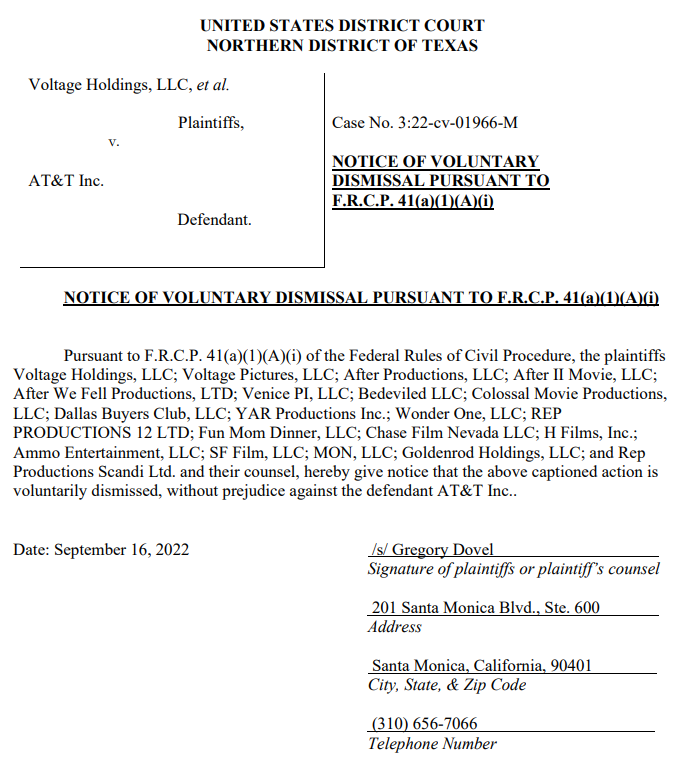Over the years, dozens of entertainment industry companies have used copyright law to protect their rights online. Some have targeted regular internet users while others have focused on pirate sites. At times, even internet intermediaries have entered the mix.
But when it comes to serial litigants Voltage Pictures and parent company Voltage Holdings, no target is too small and no target is too big to avoid scrutiny. The company has sued individual downloaders, pirate sites, apps, VPN companies, advertisers, hosting providers and ISPs, even an Internet backbone access company.
Voltage-Led Coalition Sues Major U.S. ISPs
As far as Voltage is concerned, a case can be built to show that anyone involved in an infringement is potentially liable. This month a Voltage-led coalition of independent filmmakers stood behind this assertion once again, initially by suing ISP AT&T for copyright infringement. The group then followed up with similar complaints against Verizon and market leader Comcast.
Generally speaking, ISPs in the U.S. can’t be held liable for the activities of their users, but this so-called ‘safe harbor’ is not absolute. When rightsholders send DMCA notices to ISPs complaining that their customers are downloading and sharing movies, for example, passing on these notices to customers as an early warning is an accepted practice.
When specific customers receive multiple DMCA notices against their accounts, that can be a sign that the warnings aren’t achieving the desired deterrent effect. At this point, the DMCA requires ISPs to terminate the accounts of so-called ‘repeat infringers’ under “appropriate circumstances”.
In all three complaints filed against AT&T, Verizon and Comcast, the plaintiffs claim that terminations were slim or non-existent and, as a result, the ISPs lost their safe harbor protections. No service provider in the U.S. wants to hear those words.
Potential Damages Can Be Punishing
When companies have millions of internet users as customers, being held liable for their copyright infringements is serious stuff, as the billion-dollar judgment against Cox Communications demonstrates perfectly.
Given the high stakes, these cases can run on for years, with every allegation examined in microscopic detail. Even then, repeat infringer lawsuits can be suddenly settled with zero explanation, just hours before going to trial (1,2).
That won’t be the case in the lawsuits filed against AT&T, Verizon and Comcast. In two cases just a couple of weeks and, in one case just a few days after being filed, all three have been dismissed by the filmmaker plaintiffs.
Voluntary Dismissals
The notices for dismissal were filed on Friday at district courts in Texas (AT&T), New York (Verizon) and Pennsylvania (Comcast). In function, the notices are identical – they voluntarily dismiss each lawsuit without prejudice, meaning that nothing prevents the plaintiffs from revisiting their claims in a new action at some point in the future.
The notices cite F.R.C.P. 41(a)(1)(A)(i) of the Federal Rules of Civil Procedure. This allows the plaintiffs to dismiss their own case without a court order providing the defendants have not yet filed an answer or motion for summary judgment.
There’s no requirement for the plaintiffs to say why they dismissed the lawsuits and in none of the three dismissal notices have the movie companies offered any clues. There are several possibilities, including the intent to refile for any number of reasons, or in response to an understanding between the plaintiffs and the defendants.
What Agreement – If Any?
Copyright cases involving Voltage tend to have several goals, mostly centered around money. While cash solves most copyright problems, it seems likely that the company would’ve insisted on tougher sanctions against repeat infringers moving forward, including account terminations.
Voltage and partners also want the ISPs to begin blocking torrent sites including RARBG, The Pirate Bay and YTS, but whether service providers are ready for this remains to be seen. Either way, reaching agreement on such important issues usually takes more than a few days so other factors may be at play.
Filing three multi-million dollar lawsuits against three separate ISPs (in three different districts) and then being able to dismiss them all on the same day may be an indicator of a fundamentally common denominator, one that may not have been apparent when the lawsuits were filed.
What that might be, if anything, is open to speculation. It’s not beyond the realms of possibility that bigger things may be in the works, including matters that can do without parallel litigation complications. In any event, it’s not at all like Voltage to drop lawsuits this quickly, so won’t have done so without good reason.
All three notices of voluntary dismissal can be found here (1,2,3, pdf)






